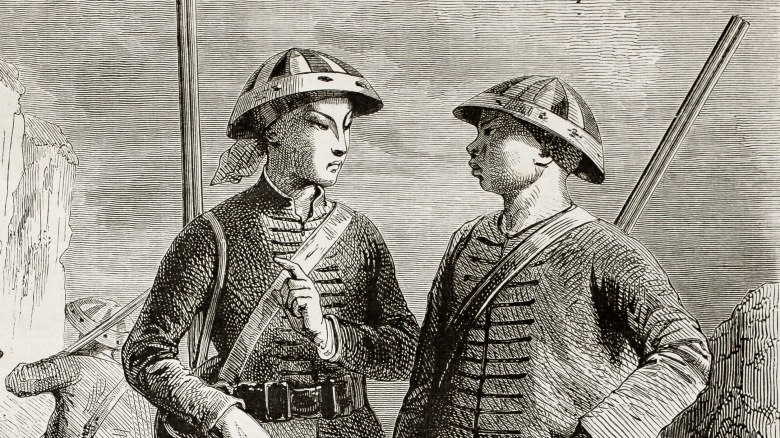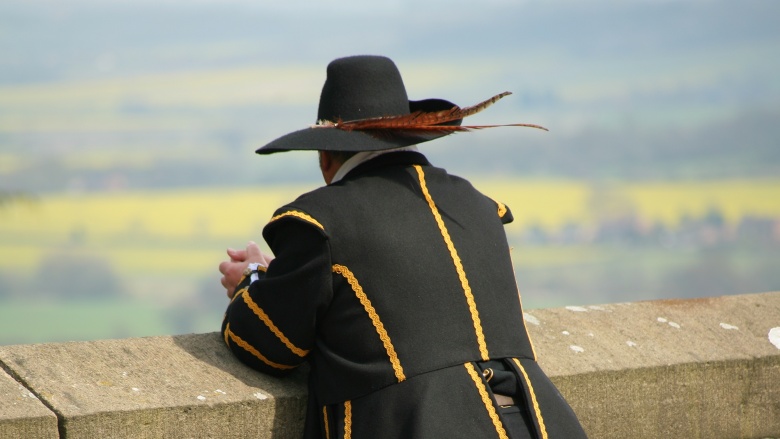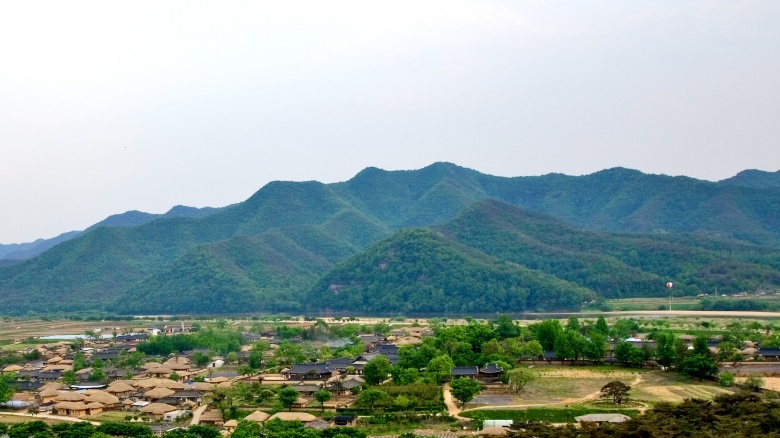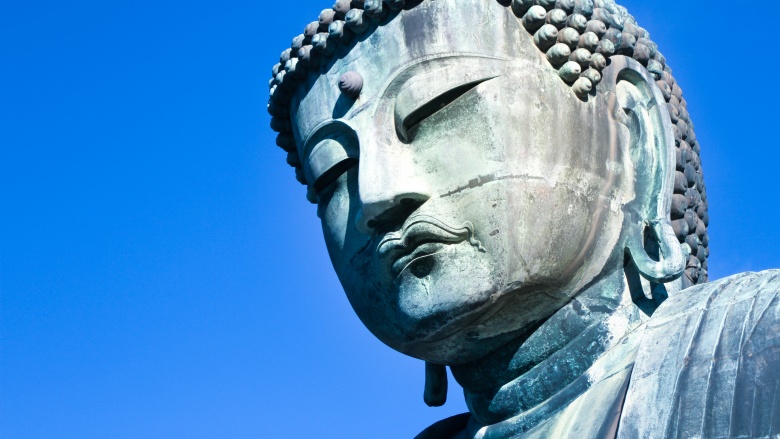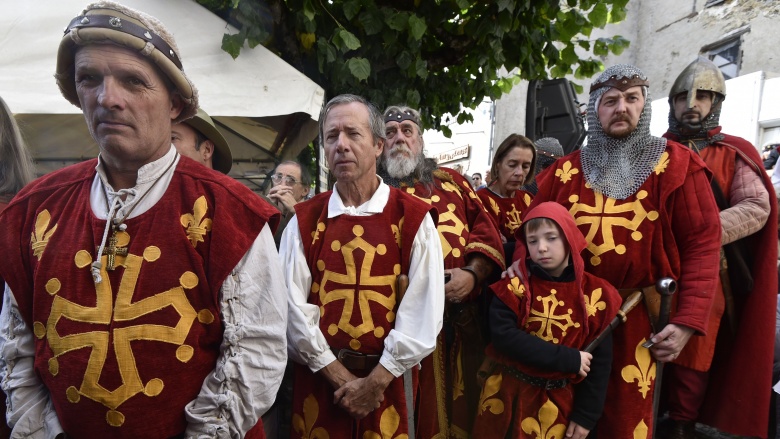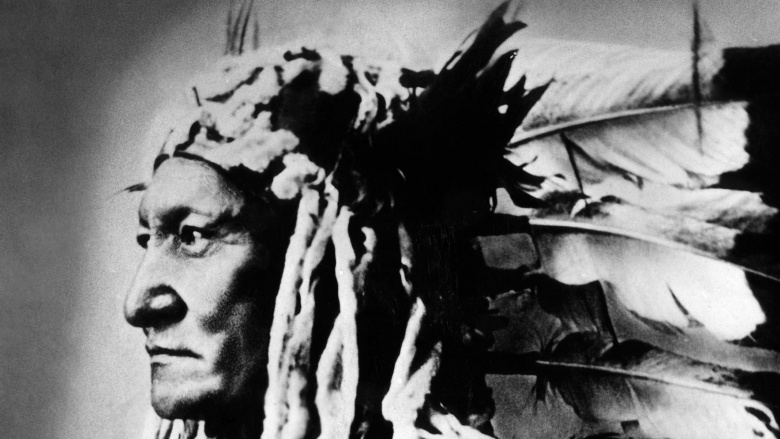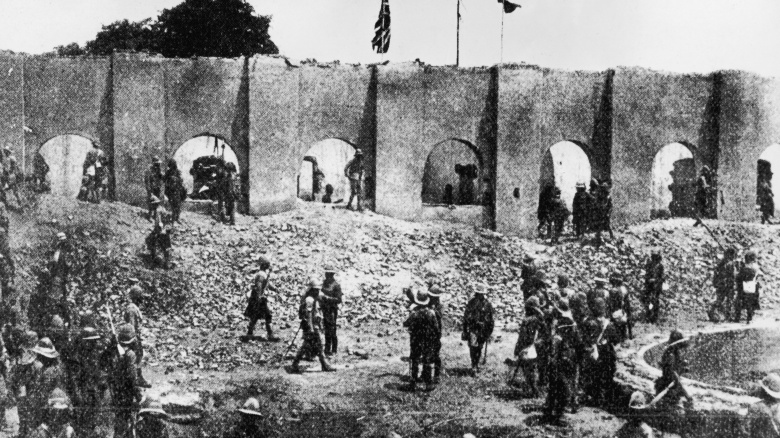Religious Cults That Changed The Course Of History
Along with geography, economics, and the desire to impress the opposite sex, religion has been one of the great guiding forces in human history. Some faiths spread across the world and change the way people view their place in the universe. Others are nipped in the bud, or remain niche faiths with little influence. And then, there are spasms of faiths like cults that got big and rolled through populations, only to be crushed. They could have been contenders, but in their failure, these cults shook empires and touched the lives of millions.
God-worshiping Society
Failing school is a tough hand to be dealt, but you gotta pull yourself together. Hong Xiuqian is an example of what comes from pushing yourself too hard. In 1836, he failed the state examinations, insanely important in 19th-century Qing China. It's understandable he was out of sorts. Still, falling into a delirious fever, and having visions of being carried in procession to a heavenly palace to meet ancient sages, is a bit much.
After having his physical heart replaced by a celestial heart, he met his Heavenly Father, Mother and older brother, Jesus Christ. It's more comforting to flunk out if you're Jesus' brother, so Hong ran with this new identity. In 1843, his ideas became more elaborate when he stumbled across a Protestant pamphlet called Quanshi liangyan ("Good Words to Admonish the Age") and combined half-understood Christian thoughts with his own unique ideas. He soon had a group of followers called the Bai Shangdi hui, or the God-worshiping Society. This would have been harmless if late Qing China wasn't such an awful place. The Manchu government ignored the problems of banditry and famine, and the Society filled the void. By 1851, Hong believed Heaven's will was for him to rise up and replace the Qing with the Taiping Tianguo, or Heavenly Kingdom of Great Peace. It's unknown how much he was thinking in his heart, "Give me a failing grade? No, I'll give all of you a failing grade!"
The rebels seized swaths of central and southern China and the southern capitol Nanking. As you'd expect, the Taiping Tianguo was a harsh militaristic theocracy, that advanced many progressive reforms. They were egalitarian, banning the cruel practice of female foot binding and promoting women as administrators and military officers. They sought social reform by banning slavery and polygamy, and sought to redistribute land to the general populace. They had strong moral laws against gambling, opium, prostitution, and drinking, and expected Sabbath observations with sermons and animal sacrifices.
To modern eyes, the Taiping are weird but probably preferable to the corrupt Qing. However, the Qing managed to suppress the movement in a war which cost 20 million lives, and also unleashed uncontrollable forces in the process. They allowed Han Chinese to rise into military ranks formerly reserved for Manchus, and requested assistance from foreign powers. Weakening their internal and external control would eventually lead to the Qing downfall.
The Xhosa's cattle-killing prophecies
In 1856, the South African Xhosa tribe were under severe pressure from British settlers and looking for a way to push them out. So when a young girl named Nongqawuse came back from chasing birds away from her uncle's crops with a story about meeting a mysterious man with a plan, people were inclined to listen. She claimed the MwaP told her if the Xhosa cattle were killed, the dead would rise from the earth. Her uncle was spiritual leader and backed up her story, elaborating that the living cattle the Xhosa raised were contaminated by a sickness. If they were killed, the Xhosa dead would rise from the sea and new cattle and livestock would emerge from secret underground caverns. Then the British would be finally driven from Xhosa lands and a new age of peace, one without death or misfortune, would arrive.
Some associated the returning spirits with the mysterious people known as "Russians," whom the Xhosa knew were powerful enemies of the British. They assumed these "Russians" were also black men who would come across the sea to aid the Xhosa if the cows were killed. This sounded great, so the Xhosa in the Eastern Cape and Transkei began to slaughter their cattle, and the paramount chief Sarhili ordered the Xhosa living under British rule to do likewise.
Still, there were some Xhosa who thought the whole thing was crazy nonsense and refused, which was understandable, considering how vitally important cattle were to their way of life. Those who believed started blaming the skeptics when the dead were tardy in arriving, and soon started to plunder and burn their farms as well. When things get crazy, it is the sane who suffer most.
Of course, the dead did not rise, and the resulting famine critically weakened the Xhosa, killing 40,000 people. The British governor of the Cape Colony took advantage with a cruel labor recruitment policy, offering the starving Xhosa jobs if they signed contracts promising to work anywhere, for any pay. Considering how swiftly the British settlers moved into Xhosa lands after the tragedy, some believe the whole situation was a deliberate British plot to weaken the powerful Xhosa people.
Fifth Monarchy Men
People have been saying we live in the End Times for centuries. One such cult group was the Fifth Monarchy Men. They interpreted the Books of Daniel and Revelations in a way which suggested there were four great empires of history: the Babylonian, Persian, Greek and Roman. This would be followed by the Fifth Monarchy, when Christ returned to Earth to rule for a thousand years of peace. Civil unrest in England and the execution of Charles I was seen by them as an obvious prelude to the End Times, in much the same way certain people today think anything bad that happens is evidence the end is nigh.
The movement spread out of London in 1651 and throughout southern England and Wales, attracting disaffected craftsmen, tradesmen and military officers. They saw Oliver Cromwell as a Second Moses, and were super excited when he dissolved Parliament in 1651. They were a major force in the Nominated Assembly, a political body based on the Sanhedrin of the Old Testament. The outbreak of the Anglo-Dutch war was celebrated, as they looked forward the outbreak of a Europe-wide war to bring down the Pope, who they saw as the Antichrist and "Roman Empire" representative.
Instead of the world order collapsing, the bickering Nominated Assembly proved ineffective, and was replaced by Cromwell's personal rule. Some Fifth Monarchy Men saw this as a betrayal and were imprisoned for sedition, while others kept quiet in hope things would get better. When Cromwell's Protectorate later collapsed and the British monarchy was restored, it was a death blow. This was not how things were supposed to go at all. Laws to repress meetings of this dangerous apocalyptic movement sent it underground, and a failed rebellion brought persecution of all nonconformist sects. The Fifth Monarchy struggled on until dying out completely in the 1680s. The End Times, meanwhile, are yet to arrive.
Donghak
In 1860, a wandering intellectual named Choe Je-u was doing what intellectuals of Joseon Korea did and, well, wandering. Somewhere in the mountains, Choe had a vision of Shangti (or Sangje), the Jade Ruler of the Universe, who gave him an immortality elixir and a manta to recite for the world's salvation. Shangti said a spiritual sickness was coming, which would spread through humanity until a new age called Hu-Cheon GaeByeok, or the Great Opening of the Later Heaven. This was the basis of the Donghak, or Eastern Learning faith, which taught humanity would be united with Heaven and all people made equal regardless of equal regardless of gender, wealth, or social status.
This faith was a new mixture of shamanistic and Taoist ideals, which stood in opposition to both the staid and repressive neo-Confucianism of the Joseon dynasty and the suspicious foreign faith called Seohak, Western Learning — or, as you probably know it, Roman Catholicism. Despite this, and his immortality mixture, Choe was caught by the authorities and executed, weirdly accused of actually being a secret Catholic all along, but his faith still spread.
In 1894, a Donghak adherent named Jeon Bong-jun led a revolt against the authorities in the small Gobu district, which soon widened into a greater rebellion protesting corruption and high taxes. As is often the case with these things, things got rapidly out of hand, and the Korean government requested military assistance from China and Japan, which was a disastrous idea. While the rebellion was violently quashed, tensions soon sprang up between the Chinese and Japanese troops, setting off events which would lead to the bloody First Sino-Japanese War of 1894-1895 and the outright annexation of Korea by Japan in 1910. Instead of a spiritual sickness, Asia was subjected instead to Japanese chemical and biological warfare.
Yellow Turbans
In the second century AD, the Han dynasty was a mess of political and military instability. So people were pleased when, in 174, a Taoist priest prophesied an age of great peace would begin, when the azure sky was replaced by a yellow sky. This was probably a figurative reference to Chinese cosmological ideas about the ages of the Earth, with the Han being associated with a blue/green color and the new age associated with the color yellow, Earth, and the semi-mythical rule of the Yellow Emperor. However, it's much more fun to assume this was a literal reference to the sky changing color.
In the wake of this prophecy, a new sect emerged called the Way of Great Peace, or Taipingdao, (sounds familiar), under the guidance of "Heavenly General" Zhang Jue and his two brothers. They sought to promote longevity through extreme versions of Taoist rituals, including fasting, specific sexual practices, and large public gatherings where people publicly confessed to sins, prayed together, and engaged in faith healing rituals. This spread swiftly through Chinese society and the Han rulers scrambled to suppress it — the movement responded in rebellion, donning yellow turbans to demonstrate their faith and defy the Han.
The Yellow Turbans were crushed, but the two-decade-long rebellion saw destruction of landowner wealth and government infrastructure, while the Han government was riven with factionalism between eunuchs, aristocrats, Confucian scholars, and the military. Meanwhile, a similar, but subtler, group called the Celestial Masters emerged, who prepared for the collapse of the Han dynasty by planting "seed people" to prepare for an era of Taoist rule. They survived, while a couple of generations later, the Han dynasty collapsed facing foreign invasion and rebellious generals. It would take centuries for centralized rule to return, and the sky remained blue.
Ikko-ikki
In the West, some see Buddhism as an inherently peaceful religion, an unwise attitude when faced with the Ikko-ikki, or "single minded leagues," a sect of Pure Land Buddhism that caused chaos in 15th century Japan. They believed salvation could be achieved only through the power of Amida, a Japanese Buddha who vowed to save all sentient life guiding it to the paradise of the Pure Land. And they were willing to fight to prove it. The sect established a dojo in the houses of powerful peasant leaders, and took money from peasants who believed they would be saved if they just paid money to the head temple, the Honganji. This alarmed the secular, supposedly-tax-collecting authorities, who were just dudes with swords, and not Buddhas of anything.
But the Ikko-ikki were too powerful to be knocked down by lords, and in 1528 they tried to settle things in their favor, by marching on Kyoto. Their soldiers believed death in battle would bring instant heavenly reward and cowards would go straight to Hell. That kind of Buddhist enlightenment being terrifying, the Shogun fled the city. Surprisingly, the Kyoto militia were about to repel the invasion and launch a counter-attack, but were surprised when a different group of warrior monks allied with the Ikko-ikki stormed undefended Kyoto and burned down the city temples.
These mad monks continued to grow in power until they annoyed someone dangerous: samurai lord Oda Nobunaga. He was irritated they were distracting him from his goal of conquering all Japan. The Ikko-ikki thought they were safe, as their temples were essentially self-sufficient towns which could withstand long sieges. Nobunaga, however, was a brutal but ingenious tactician. His solution? Build a giant wooden wall around their temple-town, set it on fire, and then just kill anyone who tried to escape. The result: 20,000 dead in one day. Ten years later, Nobunaga was able to use the support of pirates to drive the sect to the inner sanctum of Hongan-ji and simply wait until the food and ammunition ran out. The resulting surrender was surprisingly bloodless compared to earlier, possibly the result of Nobunaga thinking, "You fought me for all these years and I should probably kill you all, but fair play on the perseverance."
The Cathars
The Cathars were a sect of mysterious origins which flourished in 11th and 12th-century southern France, and while they thought of themselves as Christians, the Catholic Church accused them of being heretics, or even outright non-Christians. Considering the beliefs of the two groups, this is understandable. The Cathars rejected the notion of the Trinity and the monotheistic God, believing instead in two all-powerful entities — a benevolent creator and an evil tyrant. They rejected the idea of a priesthood or having dedicated religious centers, instead being simply divided into ordinary lay people and an Elect, who maintained an ascetic lifestyle. They believed in reincarnation, refused to eat meat, and held themselves to biblical laws against lying, dishonesty, and swearing oaths.
It already sounds different from the medieval Church, and it got worse. See, the Cathars had no qualms about suicide, euthanasia and contraception, viewed as mortal sins by the Catholic Church. They even regarded men and women as being generally equal. Worse, the Cathars were making the Catholic Church look bad, beating theologians in religious debates while mocking hypocritical priests who preached poverty while living in luxury.
Tired of being called "the Church of Wolves" by these upstarts, Rome took decisive action when Pope Innocent III launched the Albigensian Crusade in 1208. Fortunately for the Church, the Cathars had also alarmed secular authorities as their refusal to swear oaths was a slap in the face to the feudal system on which medieval Europe was built. A two-generation long war followed, which saw the extermination of the Cathars and the subjugation of once-tolerant Languedoc under the French crown.
It wasn't just the Cathars who suffered. When Crusaders asked abbot Arnald Amalric how to distinguish the Cathar from Catholics, he supposedly replied with the famous words, "Kill them all, God will know his own." That is the single coldest passing of the buck ever.[credit=Getty Images
The Ghost Dance
It is interesting how in different cultures, fever dreams are interpreted differently. Hong Xiuqian saw the ancient masters, a modern person might see Elvis, SpongeBob, or a horrific Cronenbergian combination. In January 1889, a Paiute man named Wovoka was suffering from fever during a solar eclipse. He was raised up to another world where he met with God and the happy spirits of the dead. God said if the people were good, they would join their ancestors without sickness, disease, or death. God gave him dances to teach the people in order to hasten God's arrival.
Upon returning to Earth, Wovoka began to preach that his tribe should abandon warlike ways, and peacefully work for and interact with white settlers. In theory, this could have been win-win. The settlers and the native inhabitants both saw the other as dangerous and incoherent, and the settlers were pushing aggressively into lands the Paiutes saw as their own. Wovoka's message was "Cooperate with the settlers, don't get angry when they transgress against you, because God's sending an earthquake to wipe them out soon anyway."
An appealing sentiment, it spread quickly through the Paiute to tribes beyond, eventually reaching the Dakotas where tensions ran high between the Sioux and white settlers. Ghost Dance spooked the local settlers, who didn't understand and feared the worst. Indian Agent James McLaughlin, who came to wrongly believe the influential Sioux chieftain Sitting Bull was behind the movement, sent men police to arrest him. Sitting Bull was shot in the scuffle, when a crowd gathered and confronted the police. Two weeks later, the military suppressed the Ghost Dance movement in the massacre at Wounded Knee. Though Wovoka preached peace, faith-uniting the Indian tribes spooked the US government so much, they resorted to slaughter. Fever-dream God didn't mention that part.
Mahdiyya
In the 19th century, the Sudan had been under the rule of Turko-Egyptian governors who orchestrated a slave trade which became crucial to the economy, and then Britain took over and told them in no uncertain terms to give up the slavery business now, sending General Charles Gordon, who once fought against the Qing. As the Sudanese were tired of being the puppets of foreign powers, the stage was set for the 1881 rise of cleric Muhammad Ahmad's cult. He claimed to be the Mahdi, or "guiding one," a messianic figure within Islam. He preached universal equality and common distribution of goods, denouncing the Ottoman Turks as unworthy Muslims.
The Mahdi and his Ansar (followers) from the Darfur region soon swept the country, slaughtering Gordon and his men in Khartoum in 1885. Muhammad Ahmad al-Mahdi established a government based on his absolute political and spiritual authority, laws based on the Qur'an and Sunna, and a plan for continued holy war. He died six months later, and his disciples struggled to carry on the movement. Establishing an idealistic utopian government is difficult anywhere, especially in late 19th-century Sudan.
Eventually the state was taken over by bureaucrats with experience from the older Turko-Egyptian regime, who lacked conviction but knew accounting. Momentum kept things going until 1889 when it collapsed, but the Mahdi is still considered the father of Sudanese nationalism today.

